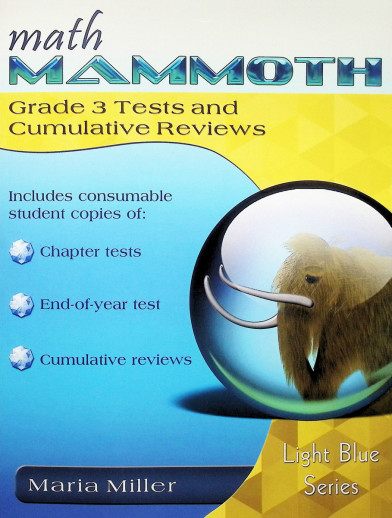We use cookies to make your experience better. To comply with the new e-Privacy directive, we need to ask for your consent to set the cookies. Learn more.
Math Mammoth Light Blue Series Grade 3 Tests and Cumulative Reviews Colored Version (2024 edition)
- Adds review and assessment to your 3rd grade math year
- Students can work independently with this user-friendly math program
- Answer key sold separately
Provided are 11 end-of-chapter tests (2 versions of chapter 10’s test), an end-of-year test, and cumulative chapter review sheets. Links to the worksheet maker are also provided in the book for extra practice. Answers to all the tests and review work are found in the separate Answer Key. 100 pgs., pb. ~Rebecca
The revised 2024 edition of Math Mammoth 3 has been restructured, yet the overall difficulty has not changed. This restructuring has taken chapter 1 and split it into two chapters, and some topics like elapsed time, shapes, area, perimeter, and fractions are now covered over more than one lesson. Two topics were removed from this level: rounding 4-digit numbers, which is now covered in level 4, and Roman numerals, which can be found online if you would like your students to study the topic. More strategies have been provided for multiplication and additional emphasis on writing equations for word problems has been added. The first chapter includes a thorough review of 2nd grade skills for those students who are new to the Math Mammoth program. Each chapter also has additional games and activity suggestions. The same four components make up your year of math (2 worktexts, test booklet, answer key). Areas of study in Grade 3 include: addition & subtraction with mental math, rounding, multiplication, time, money, four-digit numbers, division, measurements, geometry, and fractions. ~Rebecca

